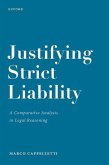In Part II the English approach to the problem of reimbursement or reward is examined, detailing its profound differences from the Continental European approach. In principle, English law does not grant the necessitous intervener a claim against the beneficiary of his intervention. Kortamnn examines the theoretical justifications for assuming this position and again concludes that the law deserves reconsideration. Finally, Kortmann concludes by demonstrating close interconnections between the two, traditionally independent issues. He argues that the law ought not to introduce a general duty to intervene without at the same time granting the intervener a claim, at the very least for reimbursement of expenses and compensation of any loss suffered in the course of the intervention.
This book examines two problems in private law which are posed by the 'Good Samaritan': First, is an intervener under a legal duty to come to the aid of a fellow human being and does he incur any criminal or tortious liability if he fails to do so? Second, having intervened, is an intervener entitled to reimbursement of expenses, remuneration, reward, or compensation for any loss he might have suffered? Does or should the remedy depend on the success of the intervention? The author examines and compares the varied responses of the Roman, French, German, and English legal systems to these problems.
This book examines two problems in private law which are posed by the 'Good Samaritan': First, is an intervener under a legal duty to come to the aid of a fellow human being and does he incur any criminal or tortious liability if he fails to do so? Second, having intervened, is an intervener entitled to reimbursement of expenses, remuneration, reward, or compensation for any loss he might have suffered? Does or should the remedy depend on the success of the intervention? The author examines and compares the varied responses of the Roman, French, German, and English legal systems to these problems.








